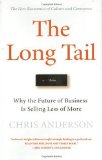B2B Blogging Is Still Relevant
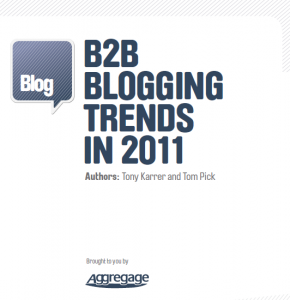 With the prevalence of microblogging and status updates via Twitter and Facebook respectively, the question is whether or not blogging is a worthwhile endeavor for B2B marketing. In Brian Solis’ “The State of the Blogosphere 2010,” post, he writes:
With the prevalence of microblogging and status updates via Twitter and Facebook respectively, the question is whether or not blogging is a worthwhile endeavor for B2B marketing. In Brian Solis’ “The State of the Blogosphere 2010,” post, he writes:
“What might have started as a form of self-expression has officially graduated into fully fledged self-actualization. 30% of corporate bloggers admit to blogging as a way to get published or featured in traditional media. 57% of self-employed bloggers share their expertise and thought-leadership as a way of attracting new clients. Across the board however, the preponderance of bloggers speak their mind to meet and connect with like-minded people. Blogs form the basis for the formation of interest graphs, which, for all intents and purposes, represent the next stage of social networking. Close behind, a significant faction of bloggers use the platform to speak their mind as tied to areas of interest, specifically hobbyists, part-timers and the self-employed”
Virtual Event Vendor Checklist Part 4: Metrics and Analysis

via Flickr by Karen Eliot
With any new initiative, the ability to tie results to objectives is instrumental for receiving continued stakeholder support for the initiative. While many vendors tout their capabilities to provide detailed statistics, the question is how to go beyond raw data to actionable data. Furthermore, how easily can I take this data to develop the right reports and analysis for my stakeholders.
PRMM Interview #16: Chris Abraham on PR and Social Media
I met Chris Abraham, President of Abraham Harrison, while he was in a San Francisco late last year. While we were unable to record an interview at the time, I sent Chris some questions via email. Here are Chris’ video responses, as he shares his thoughts about his company, why they don’t consider themselves a PR agency, and what he would like to see in 2011.
Briefly, Chris is a leading expert in online public relations with a focus on blogger outreach, blogger engagement, and Internet reputation management. He can be reached on Twitter @chrisabraham.
If you are interested in submitting suggestions for future blog posts or would like to be a guest blogger, please contact me.
The B2B Worldcom Practice Group Offers Insight for B2B Companies in 2011
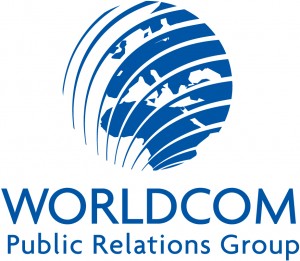 Guest Post by Cortney Rhoads Stapleton, SVP and head of the Professional Servies Practice at BlissPR New York & Aven L. James, Account Supervisor at BlissPR in New York City
Guest Post by Cortney Rhoads Stapleton, SVP and head of the Professional Servies Practice at BlissPR New York & Aven L. James, Account Supervisor at BlissPR in New York City
While most people have made their resolutions and predictions, there is still snow on the ground in NYC, so we feel that is our free pass to add our contribution. This is a synthesis of the thoughts from members of the B2B Practice Group of the Worldcom Public Relations Group, the world’s largest network of independent PR firms. In conversations with Worldcom partners in North and South America, a few trends emerged about the direction of our profession in 2011: Continue reading »
Virtual Events Gaining Traction with Associations
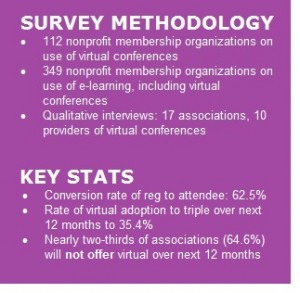 Virtual events emerged as a technology for meeting professionals and event marketers to consider during the recession. Until now, most of the media coverage and research has been focused on how corporations and publishers have implemented this technology for their respective objectives. A new report, “Association Virtual Conferences: The State of the Sector,” was published in January 2011 that provides the first look into the current use and potential use of virtual conferences within the association and non-profit space.
Virtual events emerged as a technology for meeting professionals and event marketers to consider during the recession. Until now, most of the media coverage and research has been focused on how corporations and publishers have implemented this technology for their respective objectives. A new report, “Association Virtual Conferences: The State of the Sector,” was published in January 2011 that provides the first look into the current use and potential use of virtual conferences within the association and non-profit space.
The report is published by Tagoras, which helps organizations to leverage online learning to grow revenues and engage customers. After reviewing the review, three things emerged for me: generating revenue is a focus; growth within in the association’s space is still nascent; and whether or not virtual conferences will lead to perpetual environments.
“Simply throwing up a virtual platform and attempting to replicate what happens in a place-based event – many of which are not particularly engaging or effective from a learning standpoint – is a recipe for failure. There will be a learning curve as both association educators and association learners grapple with how best to take advantage of virtual platforms, but I have little doubt that they will play an important role in association education in the coming years.” – Jeff Cobb, co-founder of Tagoras
Generating Revenue Is a Focus
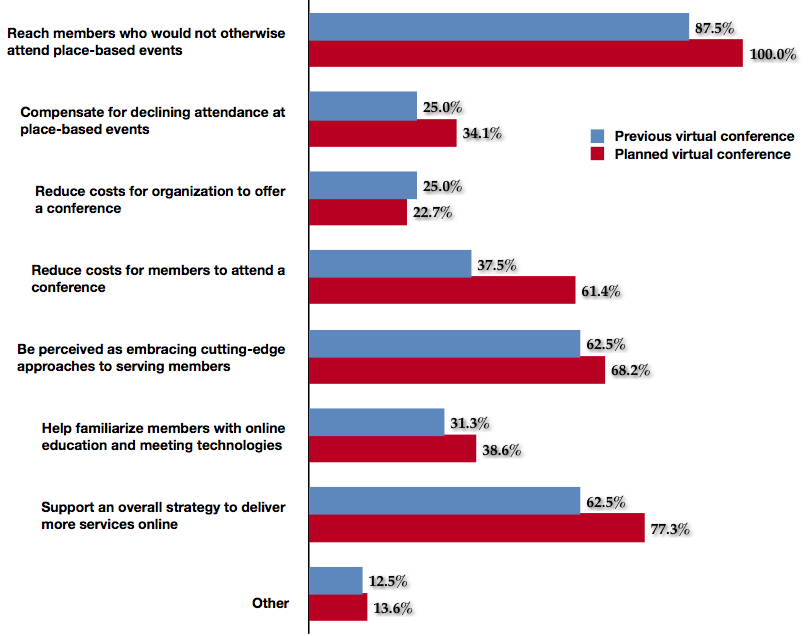
Motivation for Virtual Conference (courtesy of Tagoras)
The report provides interesting stats that highlight that virtual conferences are no longer a novelty for associations and non-profits. While driving audiences to the virtual conference may not be an issue for those who have done virtual conferences, the question of generating revenue from virtual conferences is ever present.
The business models range from charging virtual attendees similar prices as for physical conferences, to incorporating exhibiting and sponsorship opportunities to virtual conferences. At this juncture, many are looking to the physical world analogy to develop revenue opportunities for virtual conferences. I argue that this analogy may inhibit creativity to create experiences that are truly unique to online audiences; thereby discovering new ways to monetize the online conference.
Rather, organizers will be challenged to drive traffic to specific sponsors, deliver better insights into online conversations, and better match exhibitor with potential customers:
“For many exhibitors, however, the different type of interaction that occurs in a virtual booth can feel less productive, and the nature of the environment also increases the likelihood of attendees ignoring exhibits altogether. On the other hand, virtual exhibit halls do offer exhibitors a new opportunity for exposure, and because virtual conference platforms are database-driven applications at their core, there is the potential for collecting valuable data about prospective customers. Whether these benefits outweigh the challenges for most exhibitors remains to be seen.”
Virtual Has Room to Grow
According to the report, the authors state that the rate of adoption of virtual conference will triple in the next 12 months:
“In a survey conducted from November 18 to December 23, 2010, 349 nonprofit membership organizations responded to a question about whether their organization currently delivers any form of instruction via computer, including a virtual conference. Only 8.6 percent, or 30 organizations, indicated having already offered a virtual conference.
While the percentage of organizations that have already embraced virtual conferences is relatively small, association use of this format appears poised to grow significantly in the coming year—among a subset of 257 organizations, 11.7 percent have offered a virtual conference, and 23.7 percent indicated that they plan to implement one within the coming 12 months. In other words, use of virtual conferences among this group may triple in the coming year.”
While the “rate of adoption” will triple within the next 12 months to 35.4%, nearly two-thirds of associations (64.6%) have no plans to incorporate virtual conferences. From my perspective, this indicates that 1) more education is required about the benefits of virtual, 2) associations have no intention of going virtual or 3) associations are still struggling to recover from the recession and virtual is not part of the equation at this time.
Perpetual Environments: Pro or Con?
While not highlighted as a challenge to date within the report, there was indication of how associations may leverage the virtual environment for ongoing activities with their audiences, leading to perpetual environments. I anticipate this to be an ongoing issue that many organizations – both associations and corporations – will face. Organizations that have already developed communities via social media or on their own website are now creating an additional “community” through the virtual environment.
“Representatives from two other associations are working on ways to attract people back into their virtual environment for activities throughout the year. ‘Once it’s built, it’s just there,’ said one of these interviewees, ‘and it’s very inexpensive to host it for a full year.’”
While inexpensive to host the content after the initial event, continuing the virtual conference as a perpetual environment or community presents additional considerations such as proper staffing to oversee the environment, consistency and integration with existing communities, alignment with corporate objectives, and more.
According to Jeff Cobb, co-founder of Tagoras, “Perpetual environments appear to be an emerging trend among some of the early adopters in the corporate world – IBM, for instance – but I have so far spoken to only one association that is seriously considering it. That said, I think it makes a great deal of sense for organizations that hold multiple place-based events and/or Webcasts throughout the year. A perpetual virtual environment has the potential to become a valuable extension of their bricks and mortar infrastructure – or, for the increasing number of associations that operate virtually, it can become their main infrastructure. I don’t expect to see associations rush to embrace this option, but it has enough common sense to it that I would be surprised if something along these lines did not emerge over time.”
Conclusions: Achieving Full Potential of Virtual
While written for an association-based audience, the report provides useful information for organizations regarding virtual conferences from the typical features of a virtual conference to varying case uses. In addition to the number of graphs on areas about (include the items), the report provides lessons learned from early adopters and 20 top tips about virtual events.
When asked about the role of virtual conferences for learning, Cobb responded, “The most obvious is that they have the potential to increase access to education. As we point out in the report, most associations reach well under a majority of their members through place-based events. Virtual events increase the possibilities for reaching and delivering value to members who may currently be under served.”
And that is the full potential of going virtual.
PRMM Interview Episode #15: Steve Gershik, Innovative Marketer
I recently caught up with Steve Gershik, author of the Innovative Marketer blog and producer of the upcoming DemandCon conference (May 18-19, 2011, San Francisco, CA). Steve shared his thoughts on the future of marketing automation and what we can expect from DemandCon, which will help marketers and sales professional realize revenue rapidly.
Focus.com Quickly and Quietly Builds Expert Network
 NOTE: While I am a listed expert on virtual events and social media, the below represent my own personal opinions and are not reflective of Focus.com’s.
NOTE: While I am a listed expert on virtual events and social media, the below represent my own personal opinions and are not reflective of Focus.com’s.
In my blog posting, “Getting Beyond the Quora Hype,” I mentioned another site called Focus.com, which seeks to provide “millions of professionals with the expertise they need to make better business decisions.” Backed by Lightspeed Venture Partners, Trinity Ventures, and GGV Capital, Focus.com cites 1 million members with 5,000-plus business experts (Source: Focus.com Announces Increased Growth and Expansion Over Past Month, September 27, 2022 press release). Considering the buzz that Quora has received, I wanted to take a closer look at Focus.com as well.
Overview of Focus.com to Date
1. Designated Subject-Matter Experts: Focus.com has designated specific members as “experts”, who are considered subject-matter experts based on a few criteria highlighted under “what it takes to be an expert.” When Focus.com identifies an emerging topic to include, the company reaches out to a few industry experts to assist in building the expert network around that topic. Think of it as the Alltop for business experts.
For example, for virtual events, my colleague, Dennis Shiao, helped recruit experts for the topic. Since Dennis personally sent invites, this increased the likelihood of others, like myself, to participate as experts. And theoretically, increases the quality of answers. My concern is the number of vendors listed as experts compared to business end-users, which may add a level “selling” to answers.
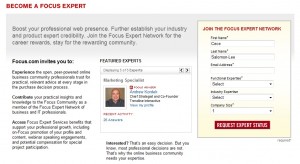 You can also request to be an expert (see image to left).
You can also request to be an expert (see image to left).
3. Expert-lead Research Briefs, Roundtables, etc.: Focus.com has done a great job in leveraging its group of experts to provide insights on industry trends via research briefs, roundtable discussions and white papers. This provides three benefits: 1) members receive insights via the collective knowledge of experts, 2) experts share their knowledge to prospective audiences, and 3) Focus.com increases its position for quality content through the efforts of its experts.
As Scott Albro, CEO of Focus.com, wrote in response to “What are some tips for using focus? on Focus.com:
“Use Focus Research for seminal decisions. Research combines the data collected from end users with analysis and commentary from Focus Experts. It’s a great way to understand complex issues such as major purchasing decisions or what best practices to adopt for a particular part of your business.”
To my knowledge, the experts provide their contributions free of charge. As Focus.com gains more momentum and demonstrates a larger following, I anticipate that this relationship may change, with more experts seeking compensation for the fruits of their efforts.
4. Expert Promotion: With that said, many experts may be content with how Focus.com heavily promotes its expert network. Experts receive invites to participate in media opportunities sourced by Focus.com and exposure through Focus’ distribution to its members network and roundtable programs. This publicity may be enough for most experts who consider this part of their overall marketing and PR efforts.
5. Search Capabilities: For the life of me, I spent a good 10 minutes trying to figure out a way to search or filter questions on Quora. Maybe it’s cleverly hidden, but it was frustrating. OK, I just found the search function and it is cleverly hidden. I thought you could only add a question in the upper left-hand tool bar. In fact, this is the search engine – just don’t click on “add question” as you type in your search term. One thing I do like about Quora’s search is that it tries to identify if a similar question has been asked as you type in the words.
On the other hand, Focus.com has the search clearly visible on the top of the page, making it easier to find questions related a specific term. And according to the website, Focus.com plans to roll out a new search feature.
Conclusions: Use Focus for Business Decisions
Overall, the key difference is how Focus.com and Quora position themselves. Focus.com clearly states it’s a site for business decisions while Quora is a place for getting your questions answered as a collaborative research database.As such, I would recommend that marketers and businesses use Focus.com as part of your marketing mix while you’re evaluating Quora’s appropriateness. Focus.com has an edge with regards to a speedier service, search capabilities, and layout for finding the topics/questions related to your interests.
Where Quora has the edge is the quality of individuals responding to questions; though these range beyond business to consumer and entertainment. The question is whether this enthusiasm will continue in the next 3, 6 or even 12 months from now. What do you think? Are you planning to monitor both Quora and Focus.com or just one?
Other Articles of Interest:
1. AppAppeal, Review of Focus.com
2. Fast Company, Focus on Business Smarts for All
About
Favorite Service
Recent Comments
- on Going Virtual Isn’t Necessarily the Answer to Replacing Your Physical Events
- on Going Virtual Isn’t Necessarily the Answer to Replacing Your Physical Events
- on Going Virtual Isn’t Necessarily the Answer to Replacing Your Physical Events
- on Going Virtual Isn’t Necessarily the Answer to Replacing Your Physical Events
- on Going Virtual Isn’t Necessarily the Answer to Replacing Your Physical Events
Ads by Google
Favorite Books
Marketing Blogs
PR Blogs
- KD Paine's Measurement Blog
- Micro Persuasion
Virtual Events & Meetings Blogs
- Cisco Virtual Environments
- It's All Virtual
- The Webinar Blog
- Virtual Edge Institute

 Follow
Follow Cece Salomon-Lee is director of product marketing for Lanyon Solutions, Inc. and author of PR Meets Marketing, which explores the intersection of public relations, marketing, and social media.
Cece Salomon-Lee is director of product marketing for Lanyon Solutions, Inc. and author of PR Meets Marketing, which explores the intersection of public relations, marketing, and social media. 

